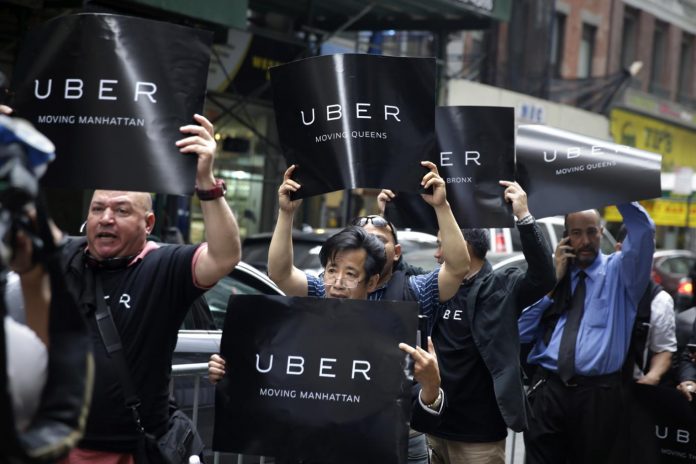LONDON — Uber has lost a tribunal case on the employment rights of drivers, in a ruling which could affect thousands of other workers.
The London Employment Tribunal said today that Uber broke the law by not providing two of its drivers—one current, one former—with holiday pay, a guaranteed minimum wage, and the right to take breaks. GMB, the union that brought the case against Uber, says the ruling is a “monumental victory,” setting a legal precedent that could devastate Uber’s ride-hailing business in the UK and reverberate throughout Europe’s burgeoning gig economy.
Uber said it plans to appeal the decision. The company described the ruling as analogous to one reached by an employment regulator in New York a few weeks ago, which determined that two former Uber drivers were eligible for unemployment payments. In both cases, Uber said, the rulings were narrow because they applied only to the named drivers, and did not explicitly find them to be employees.
Ludkin disagreed. “Uber can say all day long that this is irrelevant but I’m afraid I have to beg to differ,” she told Quartz. “The judgment is superbly written, comprehensively trounces their arguments, and says that most of it is a complete fiction of twisted language.”
Uber is the world’s preeminent startup, valued at $68 billion in its latest round of funding. The company is working on self-driving vehicles, food delivery, and even flying cars, but the core of its business remains using an app to match drivers with riders in more than 400 cities.
To keep rides cheap while still making the math work, Uber has banked on hiring its drivers as independent contractors. These workers essentially trade the benefits and protections of a traditional corporate job (health care, retirement plans, a guaranteed minimum wage) for increased flexibility and control—as Uber likes to say, the chance to “be their own boss.” For companies, sidestepping obligations to provide benefits and minimum pay can save as much as 30%.
The UK has three basic categories of employment: contractors, employees, and “workers.” People in this third category, unlike any in the US, receive more protections than contractors but fewer than full employees.
The London Employment Tribunal found the two Uber drivers who brought claims to be incorrectly classified as contractors when they should have been workers.
Uber’s rapid and stunning success around the world has led many other startups to copy its contractor-based model, creating what’s now termed the “gig” economy. Uber and its peers have touted “gigging”—a term for jumping between jobs on platforms, rather than reporting in to the same employer every day—as the future of work, made possible by smartphone technology.
But other research has questioned whether the gig setup is really so innovative. App-based services like Uber tend to exacerbate the divide between classes, employing those who have less money and resources to provide on-demand conveniences to those who have more. Self-employment also turns out to be more common in poor countries than rich ones. A report earlier this month from McKinsey found that the gig economy looks a lot like the pre-industrial one.
In the US, Uber’s employment model remains in limbo. A federal judge this summer rejected the company’s proposed $100 million settlement with drivers in California and Massachusetts who claimed they should be classified as employees rather than independent contractors.















